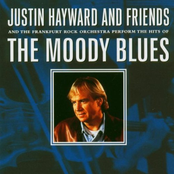Classic Moody Blues Hits (Unplugged)

Biography
Justin David Hayward (born 14 October 1946) is an English musician best known as songwriter, lead singer, and guitarist for the rock band The Moody Blues. In 2018, Hayward was inducted into the Rock and Roll Hall of Fame alongside the Moody Blues. Hayward was born in Dean Street, Swindon, Wiltshire, England, and educated at Shrivenham School in Berkshire and the Commonweal School in Swindon. He was playing in several bands as early as age 15 when he bought his Gibson 335, a guitar that appears...
Justin David Hayward (born 14 October 1946) is an English musician best known as songwriter, lead singer, and guitarist for the rock band The Moody Blues. In 2018, Hayward was inducted into the Rock and Roll Hall of Fame alongside the Moody Blues.
Hayward was born in Dean Street, Swindon, Wiltshire, England, and educated at Shrivenham School in Berkshire and the Commonweal School in Swindon. He was playing in several bands as early as age 15 when he bought his Gibson 335, a guitar that appears on nearly all of his records throughout his career, and a Vox AC30 amplifier. All previous guitars were "unsatisfactory" and required modification. He performed with local Swindon groups in clubs and dance halls playing mostly Buddy Holly songs. One of Hayward's early groups was All Things Bright, which opened for The Hollies and Brian Poole and the Tremeloes. At age 17, he signed an eight-year publishing contract as a songwriter with the skiffle artist and record producer Lonnie Donegan, a move Hayward later regretted, as it meant the rights to all his songs written before 1974 would always be owned by Donegan's Tyler Music. In 1965 he answered an advertisement in Melody Maker and auditioned as guitarist for Marty Wilde and he went on to work with Wilde and his wife in The Wilde Three.
For the most part, Hayward has used a red Gibson ES-335, though he also uses other guitars in both performing and recording, including a 1955 Martin D-28 "Dreadnought", a James Olson six-string acoustic, a black Guild acoustic, a Squier Stratocaster (essentially an inexpensive Fender Stratocaster, as Squier is a subsidiary of Fender), a Fender Telecaster, a blonde Guild 12-string acoustic (tuned to "open C" for "Question"), and in 1967 a black Gibson Les Paul. Between 1965 and 1968, he was without his Gibson 335 and relied on other instruments, most notably a 1964 Fender Telecaster and a hand-built 12-string guitar he had renovated for Donegan (he eventually bought this guitar from Donegan's widow). However, in an interview included on the Lovely to See You concert DVD (2005), Hayward says the 1963 Gibson 335 has been with him since 1967. Recently, he has played a Collings D3 on stage and on recordings. Among other instruments, Hayward also played mandolin on A Question of Balance and sitar on In Search of the Lost Chord.
Written at the end of one love affair and the beginning of another, the song "Nights in White Satin" was, according to Hayward, "in adoration of all women". Hayward married model Ann Marie Guirron on 19 December 1970. His daughter Doremi, who sings on the track "Raised on Love" on Hayward's 1977 album Songwriter, was born on 3 December 1972.
In 2013, Hayward spoke of his learning Transcendental Meditation in 1967, along with other members of the Moody Blues. Read more on Last.fm. User-contributed text is available under the Creative Commons By-SA License; additional terms may apply.
